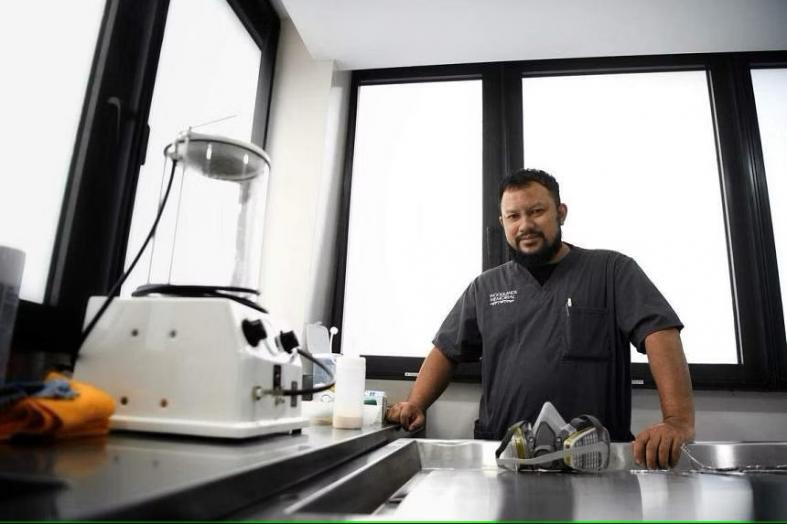He used to say he was ‘doing delivery’: Embalmer now finds meaning in serving the dead
When he first stepped into the funeral industry, Mr Raja Ashraf was too embarrassed to tell his family and friends about his occupation.
He would come up with different ways of explaining his work, such as “doing delivery” or serving as a “departures agent”.
When he finally shared that he is an embalmer, their response was one of fear – that he might have some kind of “supernatural aura”.
But that fear gradually turned to amazement and respect when they saw how he helped give his late father and other relatives a dignified farewell.
Mr Ashraf has been an embalmer and operations staff member with Woodlands Memorial since October 2022.
As an embalmer, he ensures proper care for the dead, and helps them look their best for the last time.
This takes great care and skill: preserving the body by injecting chemicals through the artery, draining the blood from the veins and organs, ensuring proper mouth closure, showering and cleaning up, dressing the body with clothes selected by the family, and applying make-up.
As an operations staff member, he also ensures the wake halls are ready for use, and attends to the requests of families.
“I learnt about the different funeral rites and practices of the different faiths in Singapore,” the 37-year-old said. “By understanding the practices based on the faith of the deceased, I will be able to serve the family better and be sensitive to their needs.”
There are currently 58 registered embalmers in Singapore.
While this is sufficient currently, Mr Hoo Hung Chye, executive director of the Association of Funeral Directors, told The Sunday Times that the demand for embalmers will increase amid Singapore’s rapidly ageing society.
He estimated that the industry may need up to 800 new entrants in the next 10 years.
“The funeral profession is still very much a service industry and requires the human touch. It is almost impossible to replace this with much automation or mechanisation,” he said.
While there may be some interest in joining the industry, the turnover is also high, he added.
“Most of them join as funeral service crew or interns to have a feel of the profession. It takes truly passionate individuals – who want to serve the deceased and their families – to stay on.”

Having a strong support network of family and friends is important, as the role can be quite demanding, said Mr Hoo.
He noted that some other service sectors may have more structured working hours and days off. Those in the funeral profession may also face social stigma, including from their own families.
The association will continue to work together with the National Environment Agency to improve the standards and perception of the profession, he said.
Mr Ashraf, a communications graduate, switched to the funeral industry from the banking sector, with his pay cut by more than half. He had worked as an anti-money laundering investigator.
In 2019, he took a hiatus from his banking career to take care of his father.
He dipped his toes into the funeral industry by volunteering as a hearse driver for an Islamic funeral service, and later joined the company as an operations manager.
His interest in the industry was piqued as he was preparing for his father’s death.
After his father died in 2020, Mr Ashraf continued working for the funeral company, as the industry was in great need of manpower during the Covid-19 pandemic. He also found meaning serving the needs of bereaved families.
To qualify for his job, he had to attend various courses, including formal embalming certification and a basic infection control course. He also took online courses on anatomy and physiology.
“I won’t deny that I was scared initially, especially on my first solo case,” he said. “I almost ran out of the embalming room.”
He had heard a strange sound coming from the body. He discovered later that this came from the instrument used for the aspiration of fluids, which had suctioned on the windpipe and throat area, causing a bellowing sound.
“I overcame my fears by telling myself that I have no ill intentions nor done anything malicious to the deceased under my care,” he said. “I’d treated them with the utmost respect, like I would towards a sleeping person or a patient.”
He added that the job can be emotionally draining, especially for suicide cases. He would wonder what happened in the person’s life that led him or her to such a drastic decision.
“My job has made me always mindful and sensitive towards people, especially those coping with mental issues or depression,” he said.
“Staring death in the face daily makes me value relationships and kinship even more. Despite my busy and irregular working hours, I will make time for my family, especially my mother.”
Mr Ashraf, who is single and lives with his mother, said he is here to stay in the industry.
Woodlands Memorial’s general manager Ben How, 51, said Mr Ashraf is good at his work because of his compassion for the dead.
“He treats every body with respect because this will be the final image that will be seen by the family and friends.”
Mr Ashraf hopes more young people will follow in his footsteps.
“I would definitely recommend young people to take up this job... (it) can be physically demanding and yet a fulfilling one,” he said. “Young people can definitely add value to the process, especially in the deceased’s make-up and dressing.”
Get The New Paper on your phone with the free TNP app. Download from the Apple App Store or Google Play Store now


